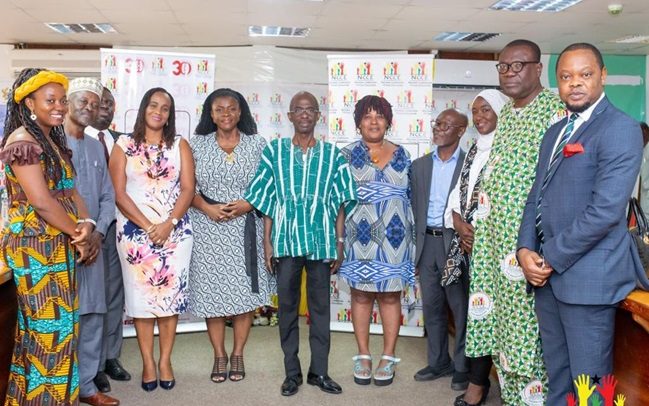A group picture of NCCE officials with members of the CSOs
The National Commission for Civic Education (NCCE) has engaged Civil Society Organisations (CSOs) on the ‘white paper’ presented by the Constitutional Review Commission (CRC) to the government.
The stakeholder engagement formed part of a series of roundtable discussions on the 1992 constitutional reforms.
The meeting was on the theme, “Three Decades of Uninterrupted Constitutional Rule: Revisiting the Agenda for Reforms.”
NCCE Chairperson, Kathleen Addy, speaking at the forum said, “We are trying to have an overview of the white paper that came out of the constitutional review process.”
She stated that the CSOs are being consulted because they constitute an important entity in all public and national conversations.
Lecturer at the Central University, Lawyer Suzie Afutu, said the proposal of the CRC with regards to the National Development Planning Commission (NDPC) is the establishment of the NDPC as an independent constitutional body with dedicated funding charged with development in the national development fund.
She further indicated that Article 86 (2) of the Constitution states that “the Commission shall consist of a chairman whom shall be appointed by the President in consultation with the Council of State.”
Ms. Afutu noted that on July 16, 2020, Majority Leader Osei Kyei-Mensah-Bonsu posed a motion for the adoption of the proposals for the amendment of the private members bill.
Senior lecturer at GIMPA, Dr. Justice Srem-Sai, spoke intensively on the powers of the President to appoint; stressing there are two major legislations that affect the powers of the President.
Mr. Srem-Sai mentioned the Presidential Office Act, which empowers the President to appoint presidential staffs, and the Presidential Transition Act which was passed after CRC recommendation, but before the ‘white paper’.
He noted the purpose of limiting the powers of the President is due to the independence of the appointee, the effectiveness and efficiency of the office holder; in large extend fairness (gender equality) and accountability.
“Any attempt to limit or change the powers of the President, you need to consider these four factors,” he added.
General Secretary of the National Democratic Party (NDP), Mohammed Frimpong, said reforms connote some sort of inefficiency of the constitution, stressing that if raising the issues of justice ability of the directory principle of state policy were strictly followed, then the issues of accountability, which is the main occupation of our political actors, would have been long addressed.
By Hudda Bala Abdul Manan


